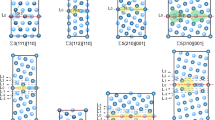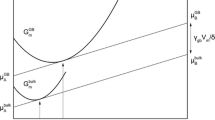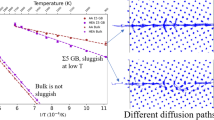Abstract
Grain boundary engineering via dopant segregation can dramatically change the properties of a material. For metallic systems, most current studies concerning interfacial segregation and subsequent transitions of grain boundary structure are limited to binary alloys, yet many important alloy systems contain more than one type of dopant. In this work, hybrid Monte Carlo/molecular dynamics simulations are performed to investigate the behavior of dopants at interfaces in two model ternary alloy systems: Cu–Zr–Ag and Al–Zr–Cu. Trends in boundary segregation are studied, as well as the propensity for the grain boundary structure to become disordered at high temperature and doping concentration. For Al–Zr–Cu, we find that the two solutes prefer to occupy different sites at the grain boundary, leading to a synergistic doping effect. Alternatively, for Cu–Zr–Ag, there is site competition because the preferred segregation sites are the same. Finally, we find that thicker amorphous intergranular films can be formed in ternary systems by controlling the concentration ratio of different solute elements.











Similar content being viewed by others
References
McLean D (1957) Grain boundaries in metals, 1st edn. Clarendon Press, Oxford
Sutton AP, Balluffi RW (2006) Interfaces in crystalline materials. Oxford University Press, New York
Randle V (1993) The measurement of grain boundary geometry, 1st edn. Taylor and Francis, London
Howe JM (1997) Interfaces in materials: atomic structure, thermodynamics and kinetics of solid–vapor, solid–liquid and solid–solid interfaces. Wiley-Interscience, New York
Gottstein G, Shvindlerman LS (2009) Grain boundary migration in metals: thermodynamics, kinetics, applications, 2nd edn. CRC Press, New York
Wolf D, Yip S (1992) Materials interfaces: atomic-level structure and properties, 1st edn. CRC Press, New York
Alexander BH, Balluffi RW (1957) The mechanism of sintering of copper. Acta Metall 5:666–677
Burke JE (1957) Role of grain boundaries in sintering. J Am Ceram Soc 40:80–85
Coble RL, Burke JE (1963) Sintering in ceramics. Progr Ceram Sci 3:197–251
Djohari H, Derby JJ (2009) Transport mechanisms and densification during sintering: II. Grain boundaries. Chem Eng Sci 64:3810–3816
Meyers MA, Mishra A, Benson DJ (2006) Mechanical properties of nanocrystalline materials. Prog Mater Sci 51:427–556
Kumar KS, Van Swygenhoven H, Suresh S (2003) Mechanical behavior of nanocrystalline metals and alloys1. Acta Mater 51:5743–5774
Dao M, Lu L, Asaro RJ, De Hosson JT, Ma E (2007) Toward a quantitative understanding of mechanical behavior of nanocrystalline metals. Acta Mater 55:4041–4065
Mathaudhu SN, Boyce BL (2015) Thermal stability: the next frontier for nanocrystalline materials. JOM 67:2785–2787
Kalidindi AR, Chookajorn T, Schuh CA (2015) Nanocrystalline materials at equilibrium: a thermodynamic review. JOM 67:2834–2843
Peng HR, Gong MM, Chen YZ, Liu F (2017) Thermal stability of nanocrystalline materials: thermodynamics and kinetics. Int Mater Rev 62:303–333
Raabe D, Herbig M, Sandlobes S, Li Y, Tytko D, Kuzmina M, Ponge D, Choi PP (2014) Grain boundary segregation engineering in metallic alloys: a pathway to the design of interfaces. Curr Opin Solid State Mater Sci 18:253–261
Seah MP (1980) Grain-boundary segregation. J Phys F Met Phys 10:1043–1064
Jorgensen PJ, Westbrook JH (1964) Role of solute segregation at grain boundaries during final-stage sintering of alumina. J Am Ceram Soc 47:332–338
Jorgensen PJ (1965) Modification of sintering kinetics by solute segregation in Al2O3. J Am Ceram Soc 48:207–210
Schuler JD, Rupert TJ (2017) Materials selection rules for amorphous complexion formation in binary metallic alloys. Acta Mater 140:196–205
Khalajhedayati A, Pan ZL, Rupert TJ (2016) Manipulating the interfacial structure of nanomaterials to achieve a unique combination of strength and ductility. Nat Commun 7:10802-1–10802-8
Khalajhedayati A, Rupert TJ (2015) High-temperature stability and grain boundary complexion formation in a nanocrystalline Cu–Zr alloy. JOM 67:2788–2801
Chookajorn T, Murdoch HA, Schuh CA (2012) Design of stable nanocrystalline alloys. Science 337:951–954
Mayr SG, Bedorf D (2007) Stabilization of Cu nanostructures by grain boundary doping with Bi: experiment versus molecular dynamics simulation. Phys Rev B 76:024111-1–024111-8
Harzer TP, Djaziri S, Raghavan R, Dehm G (2015) Nanostructure and mechanical behavior of metastable Cu–Cr thin films grown by molecular beam epitaxy. Acta Mater 83:318–332
Dillon SJ, Tang M, Carter WC, Harmer MP (2007) Complexion: a new concept for kinetic engineering in materials science. Acta Mater 55:6208–6218
Harmer MP (2011) The phase behavior of interfaces. Science 332:182–183
Cantwell PR, Tang M, Dillon SJ, Luo J, Rohrer GS, Harmer MP (2014) Grain boundary complexions. Acta Mater 62:1–48
Pan Z, Rupert TJ (2015) Amorphous intergranular films as toughening structural features. Acta Mater 89:205–214
Luo J (2008) Liquid-like interface complexion: from activated sintering to grain boundary diagrams. Curr Opin Solid State Mater Sci 12:81–88
Luo J, Wang H, Chiang Y (1999) Origin of solid-state activated sintering in Bi2O3-doped ZnO. J Am Ceram Soc 82:916–920
Gupta VK, Yoon DH, Meyer HM, Luo J (2007) Thin intergranular films and solid-state activated sintering in nickel-doped tungsten. Acta Mater 55:3131–3142
Nie J, Chan JM, Qin M, Zhou N, Luo J (2017) Liquid-like grain boundary complexion and sub-eutectic activated sintering in CuO-doped TiO2. Acta Mater 130:329–338
Darling KA, Rajagopalan M, Komarasamy M, Bhatia MA, Hornbuckle BC, Mishra RS, Solanki KN (2016) Extreme creep resistance in a microstructurally stable nanocrystalline alloy. Nature 537:378–381
Rajagopalan M, Darling K, Turnage S, Koju RK, Hornbuckle B, Mishin Y, Solanki KN (2017) Microstructural evolution in a nanocrystalline Cu–Ta alloy: a combined in-situ TEM and atomistic study. Mater Des 113:178–185
Koju RK, Darling KA, Kecskes LJ, Mishin Y (2016) Zener pinning of grain boundaries and structural stability of immiscible alloys. JOM 68:1596–1604
Mishin Y (2014) Calculation of the γ/γ′ interface free energy in the Ni–Al system by the capillary fluctuation method. Model Simul Mater Sci Eng 22:045001-1–045001-16
Pun GP, Yamakov V, Mishin Y (2015) Interatomic potential for the ternary Ni–Al–Co system and application to atomistic modeling of the B2–L10 martensitic transformation. Model Simul Mater Sci Eng 23:065006
Williams PL, Mishin Y (2009) Thermodynamics of grain boundary premelting in alloys. II. Atomistic simulation. Acta Mater 57:3786–3794
Li A, Szlufarska I (2017) Morphology and mechanical properties of nanocrystalline Cu/Ag alloy. J Mater Sci 52:4555–4567. https://doi.org/10.1007/s10853-016-0700-3
Ke X, Sansoz F (2017) Segregation-affected yielding and stability in nanotwinned silver by microalloying. Phys Rev Mater 1(6):063604
Cipolloni G, Pellizzari M, Molinari A, Hebda M, Zadra M (2015) Contamination during the high-energy milling of atomized copper powder and its effects on spark plasma sintering. Powder Technol 275:51–59
Zhou NX, Luo J (2015) Developing grain boundary diagrams for multicomponent alloys. Acta Mater 91:202–216
Zhou NX, Hu T, Luo J (2016) Grain boundary complexions in multicomponent alloys: challenges and opportunities. Curr Opin Solid State Mater Sci 20:268–277
Inoue A (2000) Stabilization of metallic supercooled liquid and bulk amorphous alloys. Acta Mater 48:279–306
Zhou N, Hu T, Huang J, Luo J (2016) Stabilization of nanocrystalline alloys at high temperatures via utilizing high-entropy grain boundary complexions. Scr Mater 124:160–163
Sadigh B, Erhart P, Stukowski A, Caro A, Martinez E, Zepeda-Ruiz L (2012) Scalable parallel Monte Carlo algorithm for atomistic simulations of precipitation in alloys. Phys Rev B 85:184203-1–184203-11
Plimpton S (1995) Fast parallel algorithms for short-range molecular-dynamics. J Comput Phys 117:1–19
Zhang L, Lu C, Tieu K (2014) Atomistic simulation of tensile deformation behavior of Σ5 tilt grain boundaries in copper bicrystal. Sci Rep 4:5919-1–5919-9
Tschopp MA, Coleman SP, McDowell DL (2015) Symmetric and asymmetric tilt grain boundary structure and energy in Cu and Al (and transferability to other fcc metals). Integr Mater Manuf Innov 4:11-1–11-14
Stukowski A (2010) Visualization and analysis of atomistic simulation data with OVITO—the open visualization tool. Model Simul Mater Sci Eng 18:015012-1–015012-7
Honeycutt JD, Andersen HC (1987) Molecular-dynamics study of melting and freezing of small Lennard-Jones clusters. J Phys Chem US 91:4950–4963
Frolov T, Asta M, Mishin Y (2015) Segregation-induced phase transformations in grain boundaries. Phys Rev B 92:020103-1–020103-5
Liu XY, Xu W, Foiles SM, Adams JB (1998) Atomistic studies of segregation and diffusion in Al–Cu grain boundaries. Appl Phys Lett 72:1578–1580
Carpenter DT, Watanabe M, Barmak K, Williams DB (1999) Low-magnification quantitative X-ray mapping of grain-boundary segregation in aluminum–4 wt.% copper by analytical electron microscopy. Microsc Microanal 5:254–266
Chen Y, Gao N, Sha G, Ringer SP, Starink MJ (2016) Microstructural evolution, strengthening and thermal stability of an ultrafine-grained Al–Cu–Mg alloy. Acta Mater 109:202–212
Tsivoulas D, Robson JD (2015) Heterogeneous Zr solute segregation and Al3Zr dispersoid distributions in Al–Cu–Li alloys. Acta Mater 93:73–86
Yan HB, Gan FX, Huang DQ (1989) Evaporated Cu–Al amorphous-alloys and their phase-transition. J Non-Cryst Solids 112:221–227
Yang JJ, Yang Y, Wu K, Chang YA (2005) The formation of amorphous alloy oxides as barriers used in magnetic tunnel junctions. J Appl Phys 98:074508-1–074508-6
Cui YY, Wang TL, Li JH, Dai Y, Liu BX (2011) Thermodynamic calculation and interatomic potential to predict the favored composition region for the Cu–Zr–Al metallic glass formation. Phys Chem Chem Phys 13:4103–4108
Daw MS, Baskes MI (1984) Embedded-atom method: derivation and application to impurities, surfaces, and other defects in metals. Phys Rev B 29:6443–6453
Fujita T, Guan PF, Sheng HW, Inoue A, Sakurai T, Chen MW (2010) Coupling between chemical and dynamic heterogeneities in a multicomponent bulk metallic glass. Phys Rev B 81:140204-1–140204-4
Cheng YQ, Ma E, Sheng HW (2009) Atomic level structure in multicomponent bulk metallic glass. Phys Rev Lett 102:245501-1–245501-4
Hu Y, Schuler JD, Rupert TJ (2018) Identifying interatomic potentials for the accurate modeling of interfacial segregation and structural transitions. Comput Mater Sci 148:10–20
Murray JL (1985) The aluminium–copper system. Int Met Rev 30(1):211–234
Turchanin M (1997) Calorimetric research on the heat of formation of liquid alloys of copper with group IIIA and group IVA metals. Powder Metall Met Ceram 36:253–263
Edwards RK, Downing JH (1956) The thermodynamics of the liquid solutions in the triad Cu–Ag–Au. I. The Cu–Ag system. J Phys Chem US 60:108–111
Esin YO, Bobrov NP, Petrushevskiy MS, Geld PV (1974) Enthalpy of formation of liquid aluminum-alloys with titanium and zirconium. Russ Metall 5:86–89
Witusiewicz VT, Hecht U, Fries SG, Rex S (2004) The Ag–Al–Cu system: part I: reassessment of the constituent binaries on the basis of new experimental data. J Alloys Compd 385:133–143
Jain A, Ong SP, Hautier G, Chen W, Richards WD, Dacek S, Cholia S, Gunter D, Skinner D, Ceder G (2013) Commentary: the materials project: a materials genome approach to accelerating materials innovation. APL Mater 1:011002-1–011002-11
Lazarus D (1949) The variation of the adiabatic elastic constants of KCl, NaCl, CuZn, Cu, and Al with pressure to 10,000 bars. Phys Rev 76:545–553
Hearmon RFS (1946) The elastic constants of anisotropic materials. Rev Mod Phys 18:409–440
Hearmon RFS (1956) The elastic constants of anisotropic materials—II. Adv Phys 5:323–382
Straumanis ME, Yu LS (1969) Lattice parameters, densities, expansion coefficients and perfection of structure of Cu and of Cu-in alpha phase. Acta Cryst 25:676–682
Hertzberg RW (1996) Deformation and fracture and fracture mechanics of engineering materials, 4th edn. Wiley, New York
Methfessel M, Hennig D, Scheffler M (1992) Trends of the surface relaxations, surface energies, and work-functions of the 4d transition-metals. Phys Rev B 46:4816–4829
Liu LG, Bassett WA (1973) Compression of Ag and phase transformation of NaCl. J Appl Phys 44:1475–1479
Straumanis ME, Woodward CL (1971) Lattice parameters and thermal expansion coefficients of Al, Ag and Mo at low temperatures. Comparison with dilatometric data. Acta Cryst 27:549–551
Yang S, Zhou N, Zheng H, Ong SP, Luo J (2018) First-order interfacial transformations with a critical point: breaking the symmetry at a symmetric tilt grain boundary. Phys Rev Lett 120:085702-1–085702-6
Tewari A, Galmarini S, Stuer M, Bowen P (2012) Atomistic modeling of the effect of codoping on the atomistic structure of interfaces in alpha-alumina. J Eur Ceram Soc 32:2935–2948
Huang ZF, Chen F, Shen Q, Zhang L, Rupert TJ (work in preparation) Combined effects of nonmetallic impurities and planned metallic dopants on grain boundary energy and strength
Dieter GE (1986) Mechanical metallurgy, 3rd edn. McGraw-Hill, New York
Chen N, Niu LL, Zhang Y, Shu X, Zhou HB, Jin S, Ran G, Lu GH, Gao F (2016) Energetics of vacancy segregation to [100] symmetric tilt grain boundaries in bcc tungsten. Sci Rep 6:36955-1–36955-12
Zhou X, Song J (2017) Effect of local stress on hydrogen segregation at grain boundaries in metals. Mater Lett 196:123–127
Liu XY, Adams JB (1998) Grain-boundary segregation in Al–10% Mg alloys at hot working temperatures. Acta Mater 46:3467–3476
Wang D, Tan H, Li Y (2005) Multiple maxima of GFA in three adjacent eutectics in Zr–Cu–Al alloy system—a metallographic way to pinpoint the best glass forming alloys. Acta Mater 53:2969–2979
Wang XD, Jiang QK, Cao QP, Bednarcik J, Franz H, Jiang JZ (2008) Atomic structure and glass forming ability of Cu46Zr46Al8 bulk metallic glass. J Appl Phys 104:093519-1–093519-5
Inoue A, Zhang W (2002) Formation, thermal stability and mechanical properties of Cu–Zr–Al bulk glassy alloys. Mater Trans 43:2921–2925
Acknowledgements
This research was supported by US Department of Energy, Office of Basic Energy Sciences, Materials Science and Engineering Division under Award No. DE-SC0014232.
Author information
Authors and Affiliations
Corresponding author
Rights and permissions
About this article
Cite this article
Hu, Y., Rupert, T.J. Atomistic modeling of interfacial segregation and structural transitions in ternary alloys. J Mater Sci 54, 3975–3993 (2019). https://doi.org/10.1007/s10853-018-3139-x
Received:
Accepted:
Published:
Issue Date:
DOI: https://doi.org/10.1007/s10853-018-3139-x




